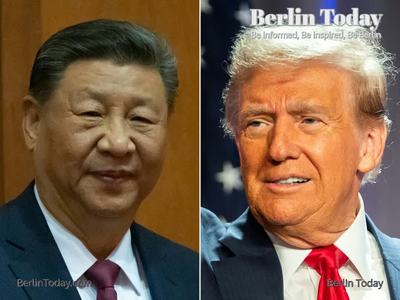German President Critiques U.S. Policies on LGBTQ+ Rights and Security at Westphalian Peace Conference
Frank-Walter Steinmeier expresses concerns over rising homophobia and geopolitical shifts during speeches in Berlin and Münster.
In a series of speeches marking significant anniversaries and events, German President Frank-Walter Steinmeier has voiced strong criticisms of U.S. policies regarding LGBTQ+ rights and the geopolitical landscape, underscoring a perceived threat to social progress and security in Europe.
Speaking at an event in Berlin to commemorate the 35th anniversary of the LSVD+, Germany's leading LGBTQ+ rights organization, Steinmeier addressed the implications of current U.S. government actions under President Donald Trump.
He stated, "In the United States, a self-anointed elite wants to turn back the clock," warning that these actions could reverse progress made in the fight for equality for the LGBTQ+ community.
Steinmeier highlighted concerns regarding the rollback of inclusivity measures, which he categorized as a 'risk of falling back into old social battles.' He specifically criticized U.S. institutions, businesses, and universities for not adequately opposing policies that limit acknowledgment of gender and facilitate the exclusion of transgender individuals from military service.
In Germany, Steinmeier lamented ongoing violations of dignity faced by LGBTQ+ individuals, noting an increase in homophobic and transphobic hate crimes.
He pointed to the rising threats to LGBTQ+ events, such as threats made against Christopher Street Day parades by far-right groups, emphasizing the need for Germans to actively defend principles of tolerance and respect as outlined in the country’s constitution.
Earlier that day, Steinmeier attended the opening of the second Westphalian Peace Conference in Münster, where he urged European nations to increase their own security and defense capabilities.
He characterized ongoing geopolitical shifts, describing them as a "double epochal shift" instigated by both Russia and the United States.
He remarked that Russia's invasion of Ukraine had significantly disrupted European security, but equally concerning was what he termed the Trump administration's attack on established transatlantic principles.
The president warned against prematurely declaring NATO ineffective and replacing it with tenuous concepts of a European army.
He asserted the necessity of a capable German military and supported discussions surrounding the possible reintroduction of mandatory military or civil service in Germany as a means of fostering national commitment.
Steinmeier concluded that Europe must not underestimate itself and should cultivate a more proactive foreign policy stance, asserting that passive approaches to contemporary crises are insufficient.
Speaking at an event in Berlin to commemorate the 35th anniversary of the LSVD+, Germany's leading LGBTQ+ rights organization, Steinmeier addressed the implications of current U.S. government actions under President Donald Trump.
He stated, "In the United States, a self-anointed elite wants to turn back the clock," warning that these actions could reverse progress made in the fight for equality for the LGBTQ+ community.
Steinmeier highlighted concerns regarding the rollback of inclusivity measures, which he categorized as a 'risk of falling back into old social battles.' He specifically criticized U.S. institutions, businesses, and universities for not adequately opposing policies that limit acknowledgment of gender and facilitate the exclusion of transgender individuals from military service.
In Germany, Steinmeier lamented ongoing violations of dignity faced by LGBTQ+ individuals, noting an increase in homophobic and transphobic hate crimes.
He pointed to the rising threats to LGBTQ+ events, such as threats made against Christopher Street Day parades by far-right groups, emphasizing the need for Germans to actively defend principles of tolerance and respect as outlined in the country’s constitution.
Earlier that day, Steinmeier attended the opening of the second Westphalian Peace Conference in Münster, where he urged European nations to increase their own security and defense capabilities.
He characterized ongoing geopolitical shifts, describing them as a "double epochal shift" instigated by both Russia and the United States.
He remarked that Russia's invasion of Ukraine had significantly disrupted European security, but equally concerning was what he termed the Trump administration's attack on established transatlantic principles.
The president warned against prematurely declaring NATO ineffective and replacing it with tenuous concepts of a European army.
He asserted the necessity of a capable German military and supported discussions surrounding the possible reintroduction of mandatory military or civil service in Germany as a means of fostering national commitment.
Steinmeier concluded that Europe must not underestimate itself and should cultivate a more proactive foreign policy stance, asserting that passive approaches to contemporary crises are insufficient.
Translation:
Translated by AI
AI Disclaimer: An advanced artificial intelligence (AI) system generated the content of this page on its own. This innovative technology conducts extensive research from a variety of reliable sources, performs rigorous fact-checking and verification, cleans up and balances biased or manipulated content, and presents a minimal factual summary that is just enough yet essential for you to function as an informed and educated citizen. Please keep in mind, however, that this system is an evolving technology, and as a result, the article may contain accidental inaccuracies or errors. We urge you to help us improve our site by reporting any inaccuracies you find using the "Contact Us" link at the bottom of this page. Your helpful feedback helps us improve our system and deliver more precise content. When you find an article of interest here, please look for the full and extensive coverage of this topic in traditional news sources, as they are written by professional journalists that we try to support, not replace. We appreciate your understanding and assistance.











